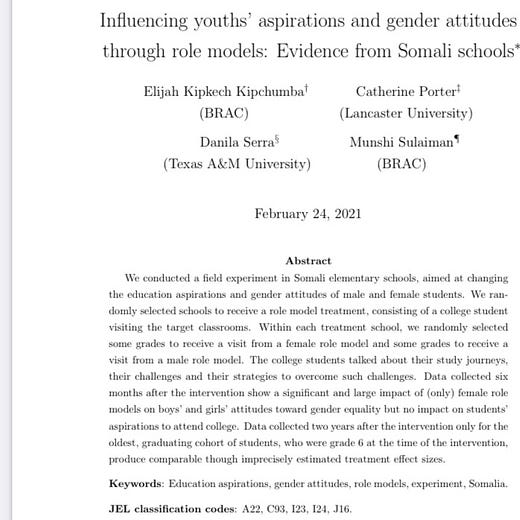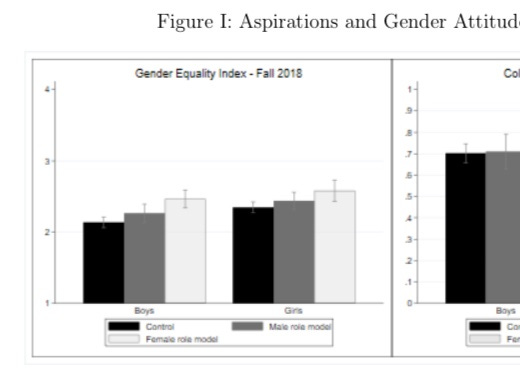Best of #econtwitter - Week of March 7, 2021
Mar 08, 2021
Welcome readers old and new to this week’s edition of Best of Econtwitter. Thanks to those sharing suggestions, over email or on Twitter @just_economics.
Paper summary threads

Justin Sandefur@JustinSandefur
Forthcoming in JPE:
The cross-country relationship between heat and lower GDP is corroborated by daily fluctuations in wet-bulb temp in India, reducing labor supply + productivity of manufacturing firms.
journals.uchicago.edu/doi/pdf/10.108…


6:48 PM · Mar 4, 2021
44 Reposts · 160 Likes

Johanna Rickne@johannarickne
People in high-paying workplaces find their work less meaningful. Women self-report more meaningful work than men, especially in low-paying workplaces. This pattern is from Swedish nationally representative survey data.

7:36 AM · Feb 19, 2021
49 Reposts · 318 Likes

Lucie Gadenne@LucieGadenne
Cash is better than in-kind, right? Our new WP (with @sandipz @sambnorris, M Singhal) begs to differ. In developing countries prices of essential commodities fluctuate a lot, so giving households commodities instead of cash can increase welfare – by providing insurance. (1/6)
4:25 PM · Mar 3, 2021
50 Reposts · 206 Likes

Justin Wolfers@JustinWolfers
THREAD: My coauthors and I have a new NBER working paper out studying economics seminars.
Our findings: Women receive around 12% more questions when presenting, including more hostile and patronizing questions.
Useful NYT summary from @bencasselman
nytimes.com/2021/02/23/bus…

NBER @nberpubs
In many economics seminars, women are asked more questions than men, including more patronizing and hostile questions, from @DupasPascaline, @SasserModestino, Muriel Niederle, @JustinWolfers, and The Seminar Dynamics Collective https://t.co/AHreSHBlBB https://t.co/j6QZ9vrHot
7:42 PM · Mar 1, 2021
176 Reposts · 442 Likes

Berk Özler@BerkOzler12
Today in Development Impact, I cover the new WP on Gender Dynamics of Econ Seminars and try to point out a few important things you might have missed just from reading the NYT article a week or two back.
blogs.worldbank.org/impactevaluati…
Very short thread below, as the blog post is not:
blogs.worldbank.org
Dynamics of economics seminars: more questions than answers?

1:01 PM · Mar 1, 2021
7 Reposts · 23 Likes

Danila Serra@danilaserra_eco
**Female role models matter**
New WP w/ @EconCath @KipkechElijah and Munshi Sulaiman.
Make & female college students visited primary schools in Somalia. Female RMs impacted students’ attitudes toward gender equality. No impact on education aspirations.
pvsessions.tamu.edu/RePEc/SerraSom…


2:51 PM · Mar 2, 2021
34 Reposts · 133 Likes

Arshia Hashemi@ArshiaHashemi
Revised draft of my markups paper with Steve Bond, @GregWKaplan, and @pzoch5.
Summary thread 👇 (1/9)
static1.squarespace.com/static/5e96d45…

9:07 PM · Mar 1, 2021
3 Reposts · 12 Likes

Arpit Gupta@arpitrage
Interesting thread on the impacts of Berlin rent control. Some similar adverse supply consequences as in SF, as in paper by Diamond, McQuade, Qian. h/t @Noahpinion
aeaweb.org/articles?id=10…


Andreas Kluth @andreaskluth
1/8 One year ago, the left-leaning government of Berlin introduced unprecedented rent controls.
Lots of economists warned against it.
So what do the numbers say now?
A thread.
https://t.co/wIDm9awhre
#Mietendeckel
@bopinion
4:16 PM · Mar 2, 2021
3 Reposts · 8 Likes

Ellora Derenoncourt@EDerenoncourt
We find significant increases in the wages of other employers in response to large retailer MWs. Our estimates suggest a 10% increase in Amazon's hourly wages led to a 2.6% average increase in hourly wages at non-Amazon employers in the same CZ. 4/8

4:02 PM · Mar 5, 2021
23 Reposts · 97 Likes
^also: Seattle minimum wage (lack of a s.s.) effect on crime

Juan Vargas@juanf_vargas
Forthcoming in @restatjournal! My paper with #MounuPrem and @DanielMejiaL "The Rise and persistence of illegal crops: evidence from a naive policy announcement"
🎉🥂
Thread 👇 (1/n)

5:03 PM · Mar 2, 2021
74 Reposts · 344 Likes

Santiago Tobón@SantiagoTobon
I study the effects of prison quality on recidivism using data from Colombia.
To estimate causal effects, I leverage the quasi-random assignment of inmates to newer, less crowded, and higher service prisons.
I find that inmates assigned to newer facilities recidivate less

3:06 PM · Mar 2, 2021
1 Repost · 8 Likes

Renee Bowen@renee_bowen_lyn
This thread about my own paper, but written way better than I could have! Thanks @ben_golub. Man I love Twitter, in spite of some possibly unpleasant side effects.

Ben Golub @ben_golub
Excited to watch this talk by @renee_bowen_lyn : a model of echo chambers in social networks and how they take way less "behavioral error" than you might have thought to get started. https://t.co/OXlgs0nmgg
11:22 PM · Mar 4, 2021
7 Reposts · 47 Likes

Jason Abaluck@Jabaluck
One element new to this revision is a discussion of how our approach (IV validation of OLS value-added estimates) relates to approaches common in labor economics (such as AKM). This connects to some recent Twitter discussions about research design with @paulgp.

Peter Hull @instrumenthull
We've revised our paper (with @Jabaluck, @mmcaceresb, and @AmandaStarc1) on the mortality effects of Medicare Advantage plans
https://t.co/FdyvqE5NoB
Previous summary thread here -- the revision is similar, but now with more robustness/balance tests :)
https://t.co/kd49F32SHn https://t.co/qe1gBFbB4D
6:09 PM · Mar 6, 2021
7 Reposts · 47 Likes
More: US RTW laws for teachers; geography and culture; immigration and redistribution preferences; drivers of sexual violence; yet another rideshare entry DiD; variation in Indian living standards
Public goods

AMIE@econmentoring
@p_mukherj and @Prof_Nishith_P are delighted to introduce #AMIE (Association for Mentoring and Inclusion in Economics) @econmentoring! Visit us at econmentoring.org. #AMIE is supported by @YaleRISE @UConnGlobal & @UWMadison. Please follow us and R/T 1/14
econmentoring.org
econmentoring.org - Amie-econmentoring.org

6:24 PM · Mar 2, 2021
73 Reposts · 113 Likes
Interesting discussions

Jake Vigdor@JakeVigdor
Here's some data on 2 PhD programs @DukeU.
Roughly equal in size.
@usnews rankings and yield rates (% of admitted students who accept the offer) suggest the bio program is more prestigious.
The econ program receives nearly 10x more applications.
The Econ Bottleneck: a 🧵

4:59 AM · Mar 3, 2021
64 Reposts · 294 Likes
^thread, lots of replies (eg), see also (though this is a twitter topic that, somehow, has too little discussion of identification and equilibrium)

Jake Vigdor@JakeVigdor
For all the angst about the rise of the predoc and increasing time to complete the econ Ph.D., data from @NSF show the average time from BA to PhD for 2019 recipients in econ (8.5 years) is tied for lowest in the social sciences AND lower than the comparable stat (9.7) for 1994!

8:53 PM · Mar 1, 2021
7 Reposts · 46 Likes

Ana Trindade Ribeiro@anatrindaderib
Imho, the recent trend in “enforcing” reproducibility at econ top journals has become mostly a waste of time on both ends. A thread:
After an afternoon of trying to find a paper I was interested in and could replicate, I decided to do a bit of data collection.
1/n #EconTwitter
6:42 PM · Mar 2, 2021
8 Reposts · 33 Likes

Jason Abaluck@Jabaluck
An important implication of the way that public economists think about insurance: health insurance shouldn't make people much healthier unless people are making big mistakes (and health insurance *does* make people healthier)
6:32 PM · Mar 2, 2021
8 Reposts · 41 Likes

Victor H. Aguiar@vectornomist
limited space at the top journals, it's truly a zero-sum game. I got this personal experience, where I submitted a paper to journal X, and then almost simultaneously I got a referee request from the same journal X for a "competing" paper. Short, story both papers got rejected.
5:28 PM · Mar 7, 2021
6 Likes
^this week in journal innovation: at JEEM, at the Journal of Urban Economics

scott cunningham@causalinf
Some of you have learned theres going to be prelims. If you hate that, on some justice grounds, I am sorry that you’re angry and having a hard time. And if you’re scared, I’m sorry too for that. But you can do this. 1/n
1:06 PM · Mar 4, 2021
56 Reposts · 411 Likes
^personal story

